| Article ID | Journal | Published Year | Pages | File Type |
|---|---|---|---|---|
| 2114412 | Cancer Letters | 2009 | 7 Pages |
The root of Angelica gigas Nakai contains two major coumarins, which have been previously identified as decursin and decursinol. Decursin has been demonstrated to exhibit potent anti-cancer activity both in vitro and in vivo. In this study, we found that decursin and decursinol at non-cytotoxic doses inhibited the VEGF-induced proliferation, migration, and capillary-tube formation of HUVECs. Moreover, decursin and decursinol suppressed microvessel formation on chorioallantoic membranes in fertilized eggs and into mouse Matrigel plugs. The oral administration of decursin and decursinol also reduced VEGF-induced angiogenesis in Matrigel. Furthermore, decursin and decursinol reduced the phosphorylation of ERK and JNK, but not p38 MAPK, in VEGF-stimulated HUVECs. Taken together, our results reveal that decursin and decursinol inhibit VEGF-induced angiogenesis by reducing the activation of ERK and JNK in HUVECs, and possess potent in vivo anti-angiogenic activity, coupled with the advantage of oral dosing. Thus, these compounds may have the potential for the treatment of cancers dependent on VEGF-induced vascularization.
